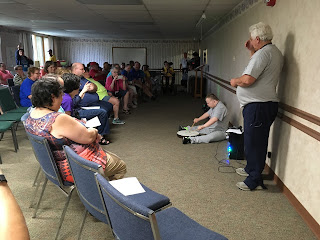<tap> <tap>... "testing, testing"
It's been awhile!Our annual summer retreat was a few weeks ago, with the theme of "Spread your Wings, Share your Gifts!" We talked about some very particular gifts- the Gifts of the Holy Spirit, and naturally we also talked a lot about our own gifts and talents.
A greatly anticipated aspect of this year's retreat was a talent show. Participants signed up to do a variety of things- stand up comedy, puns or other jokes, dance, a Darth Vader impression, one participant displayed a puzzle she had put together, another recited three of his favorite Scripture passages, and even provided a copy for everyone to take home. The vast majority of folks signed up to make music. One played the ukelele, another is part of a drum line and played a song for us, but most wanted to sing. The overwhelming response to this really made concrete something I knew intellectually and even personally but had not seen so clearly before. Music is a language that breaks down barriers!
My sister is deaf, but something that has always fascinated me is how much she LOVES to be at live concerts. She loves to watch the musicians, and when she is able, to see and touch the instruments. Clearly Mary is not alone in this- it was pure JOY to watch folks, Deaf and hearing alike, enjoy and dance to Mariachi music at Pastoral Week. There are actually music/dance clubs that are specially outfitted to appeal to a Deaf clientele. Music is something so deep and integral to us that it really seems to transcend even our sense of hearing. What more evidence do we need of this than the absolutely gorgeous video of Mandy Harvey's audition on America's Got Talent?
And then there is Joseph, who doesn't speak much and what is does say is largely repetitive. Joe seemed shy to sing at first, but then asked us all to "sing with him" and ended up getting everyone to join him in a rousing "You are my sunshine".
Another young lady stunned us a short time later when we opened up the floor for a little karaoke. Jenny is not non-verbal, but like Joe the majority of her speech is repetitive. Well, she asked for a song- "I'll Never Break Your Heart" by the Backstreet Boys- and then as the song began proceeded to take the microphone and belt.out.every.word. With tone- and pitch! As she was singing, the man who is in charge of her care taking services stepped in and literally did a double take when he saw her. As he began to videotape, I asked if he had ever seen her do anything like that- to which he shook his head and said never in the six years he has known her.
We had singers who can't read, but can remember lyrics, and hold a tune better than I can. There were singers who were new to the retreat, and shy, but once they stepped up there for a duet with a new friend they had huge smiles on their face.
I worried, because people were so bravely standing up to do something they love, that I would need to give the "if you can't say anything nice..." speech- but I never did- there was simply never a need. The response was always along the same vein- high-fives, a hearty and genuine "good job!", and plenty of sensory-friendly ASL applause.
So, what's the point of all this? What does a Backstreet Boys song have to do with catechesis? Well first, I'd like to encourage you to make room for music in your life and in your classroom. Music improves memory (how many commercial jingles can you remember before you remember your short grocery list?) Music engages us and can provide stimulus on several different sensory levels. We well know that music provides words for feelings and relationships that can be difficult to express even if you don't have communication challenges! This is doubly true when we try and express our love for God. Beautiful melodies arouse curiosity and help us sense and express our experiences and emotions in a depth that words alone cannot. Something expressed so wonderfully in this powerful scene from "The Mission".
Which brings me to one of the most cherished moments of our weekend- the sing along with Sr. Cathy.











%2B(2).JPG)



%2B(2).JPG)